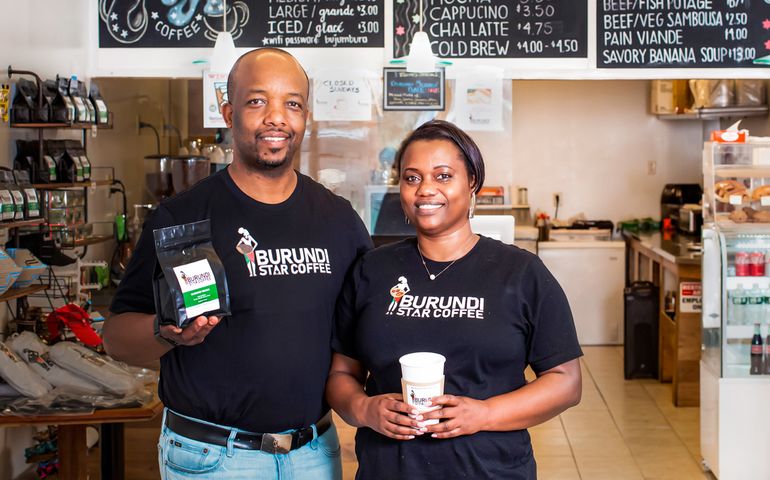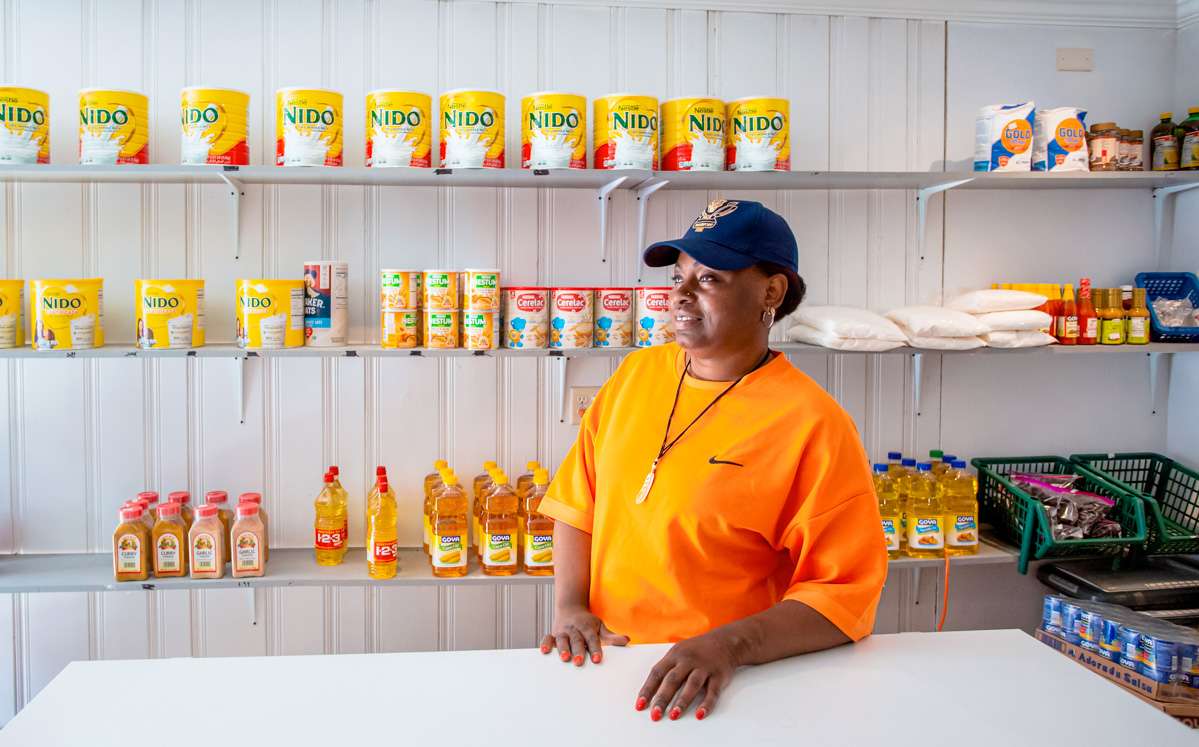
Lending a hand: New Maine microloan program supports immigrant-owned small businesses
 Photo / Tim Greenway
Burundi Star Coffee owner Jocelyne Kamikazi, with her husband André Nzeyimana, at her coffee shop in Portland.
Photo / Tim Greenway
Burundi Star Coffee owner Jocelyne Kamikazi, with her husband André Nzeyimana, at her coffee shop in Portland.
Long before Jocelyne Kamikazi became a coffee entrepreneur, she hauled baskets of red, ripe coffee cherries on her head to the wash station in her native Burundi. After making the 30-mile trek from her father’s farm, she’d sometimes have to wait in line for two days at the station.
Today, on St. John Street in Portland, she owns Burundi Star Coffee, a café and retail shop she opened in March 2020 and runs with her husband, André Nzeyimana. The name of the business is a nod to the bright night sky that gave her comfort in her East African homeland.
With her eye on expansion, Kamikazi plans to use a recently obtained low-interest $10,000 loan to buy a machine to package coffee, which she currently does by hand two hours every day.
“It’s a lot,” the University of Southern Maine alumna says of the task, very different from her previous work as an interpreter at Maine Medical Center. As she shops for a packaging machine to fit her space, her long-term goal is to source coffee directly from growers in Burundi — she currently goes through a wholesaler — inspired by what Mike Mwenedata is doing at Portland-based Rwanda Bean Co., returning half his profits to Rwandan coffee farmers.
“It’s our responsibility to help them,” she says at the shop one morning as customers sip coffee and thick banana soup, “and that’s how we can be involved in the production.”

Microlending
The loan she secured from Portland-based cPort Credit Union is underwritten by the Indus Fund, a new microloan program for small business owners in Maine’s growing immigrant community. Kamikazi was able to borrow the money at a much lower interest rate than the $44,000 bank loan she used to start her business and still has to repay, since all Indus Fund loans have a fixed rate of 3.5% and a maturity of five years.
With close to $300,000 raised from 14 individual and corporate investors, the Indus Fund is touted as Maine’s first and only immigrant-specific microfinance loan program connected to the existing banking system. The goal is to break down barriers for immigrants who might otherwise be shut out of traditional bank financing.
“The past was defined by unintentional redlining,” says the fund’s Turkish-Pakistani-American founder and managing partner, Kerem Durdag, who named the fund after South Asia’s Indus River. “The present and the future are defined by addressing those injustices and being proactive and progressive about it.” He’s also on a mission to bring affordable broadband to all of Maine, via his role as president and CEO of Biddeford-based carrier GWI.
Durdag, a member of the Maine Angels group of investors and a former entrepreneur himself, says that while he never faced hurdles in his own business ventures, he observed it with others.

“Having seen firsthand interest rates up to 25% offered to immigrant business owners out of fear,” he says, “my sensibility is to work with banks to completely downshift that fear.”
While the Indus Fund started with cPort, he says, “it is not only my hope, it is my goal in life, to get more banks to do this, and I will not stop until we cover all of Maine.”
Banking the ‘unbanked’
Microfinance, or microcredit, is a growing category of financial services targeting individuals and small businesses who lack access to conventional banking.
In 2019, an estimated 5.4% of U.S. households were “unbanked,” meaning that no one in the household had a checking account at a bank or credit union, according to a report by the U.S. Federal Deposit Insurance Corp.
The same report found that a large proportion of minorities were shut out of the federal Paycheck Protection Program, with loans reaching only 20% of eligible businesses in states with the highest densities of Black-owned enterprises. Coverage rates were even lower in counties with the densest Black-owned business activity.
Another report, by the Federal Reserve Bank of New York in August 2020, said one reason Black-owned firms were unable to access PPP loans was because they entered the pandemic in a weaker financial position than white peers. Black firms were also found to be almost twice as likely to go out of business as small firms overall.
For a growing number of unemployed or low-income individuals around the world, microfinance offers access to banking and insurance services otherwise out of reach. One projection, from the “Microfinance — Global Market Trajectory & Analytics” report published in March, puts the global market at $303 billion by 2025, about double what it was estimated to be in 2020.
In Maine, the Indus Fund is the first and only immigrant-targeted microfinance loan program available for banks and credit unions, in a state where 2,368 foreign-born business owners made up 2% of all self-employed residents in 2018 and generated $15.3 million in business income, according to the Washington, D.C.- based American Immigration Council.
The council notes that while only 4% of Maine residents are immigrants, they make up a vital, educated share of the labor force.
Durdag makes a similar economic case for Maine’s financial institutions to support the Indus Fund even in today’s rising interest-rate environment.
“Marginalized communities, like the immigrant community, are the fuel to the next scale of economic growth,” he says. “Ignore that at your own peril and you accelerate your trajectory to irrelevance over the next 20 to 40 years.”
Shouldering the risk
By working with existing financial services infrastructure rather than trying to reinvent the wheel, Durdag says the idea is to “make the wheel that exists larger and more encompassing.” The fund does that by taking on all the financial risk, so the lender doesn’t have to. “The goal is that once it is demonstrated that the financial risk is small and can be mitigated, the bank can have further and deeper engagement with the immigrant community.”
As a starting point, the Indus Fund teamed with cPort Credit Union, where immigrants make up just over 10% of its 100 employees.
Including the loan for Burundi Star Coffee, cPort has made eight loans so far backed by the Indus Fund, according to Honorine Uwishema, the Rwanda-born manager of the credit union’s Forest Avenue branch in Portland. Loans of up to $10,000 are available to first-generation immigrants to get a new business off the ground or support an existing one.
Uwishema says that while cPort membership isn’t a requirement to get a loan, some recipients have joined the credit union. Her message to potential applicants: “Don’t be afraid to come to us for help, we’ll work with you and are here to help.”
Even before the Indus Fund was created, cPort had a microfinance small business loan program that provided more than $400,000 to immigrants, usually in amounts averaging below $10,000 but with rates adjusted for term and credit.
The credit union also helps foreign-born members fund their path to U.S. citizenship, a process that can cost as much as $8,000, through a Citizenship Loan Product created at the request of Alain Nahimana, a Burundi native who founded the Greater Portland Immigrant Welcome Center and served as executive director until his death in May 2020. The average size of citizenship loans is around $3,400, with interest rates starting at 5.5%.
“Our microfinance loan program complements the Indus Fund should the New Mainer business owner want additional funding beyond the Indus Fund limit,” says Gene Ardito, cPort’s president and CEO.
Besides helping with an immediate financial need, the loans help immigrant borrowers establish a credit history with multiple other benefits, like the ability to get a home mortgage or car loan.
Loan recipients are also offered support through a mentorship program developed with Maine’s Department of Economic and Community Development, using SCORE Maine’s mentor pool.
“While we believe that all people and businesses can benefit from a mentor/mentee relationship, it can be especially important for folks who are navigating a new culture, banking system, and/or business community,” says Wendy Blackwell-Moore, a Portland-based consultant on the Indus Fund’s governance committee.
Growth ambitions
Besides Burundi Star Coffee, other Indus Fund loan recipients include Mimie Mobesha, a native of Kinshasa in the Democratic Republic of the Congo, to buy products including dried catfish from Africa as well as fresh fish and to sell at Mimio’s Boutique, at 25 Portland St. in Portland. The small grocery store is frequented by fellow immigrants using General Assistance vouchers and food stamps. It’s just her and her father running the store, which is next to a combination hair-braiding beauty shop and clothing store she opened in 2021.
While the pandemic was tough on business, she hopes to eventually expand both ventures, saying, “By the grace of God, I will try to have something bigger.”

At 621 Forest Ave. in Portland’s Woodfords Corner neighborhood, Niky Watler, originally from Cartagena, Colombia, and his wife Martha Leonard, originally from New Hampshire, own and operate Maíz, a restaurant specializing in Colombian street food. They met in Colombia, where she was teaching and he was working as a lawyer. They say they became cPort members after moving to Maine because they were leery of traditional banks and lacked a credit history.
They used the $10,000 Indus Fund loan to defray the cost of a $35,000 food truck. That helped them explore other markets for their Colombian street food concept during the pandemic, including Brunswick, where they were about to open a second brick-and-mortar location by mid-May about twice the size of their Portland eatery.
“I don’t think we would have done the food truck if we didn’t access the loan,” Leonard says, “because you can build a business and maintain it, but it’s very hard to expand if you don’t have a little bit of an extra cushion.” She says she hopes the new Brunswick spot will be the first of many other locations as the couple pursues sourcing Maine-grown corn for their arepas, dishes made from corn they grind in-house.
“Right now we are knocking on the doors of different farms to find different kinds of corn we can work with,” Watler says. “But the goal at the end of all of this is to grow our own corn here in Maine.”

Quincy Hentzel, president and CEO of the Portland Regional Chamber of Commerce, hails the Indus Fund as a “game changer for many New Mainers with a dream of starting their own business” and Durdag as a visionary dedicated to improving the community.
Longer-term, Durdag’s goal is to expand the fund to around $1 million and for the model to be replicated elsewhere.
“Organizations and communities have reached out to us and we, in the spirit of open-source information, are sharing what we are doing and the lessons we are learning,” he says. “There is a Talmudic saying that when you save one life, you save a universe.”










0 Comments